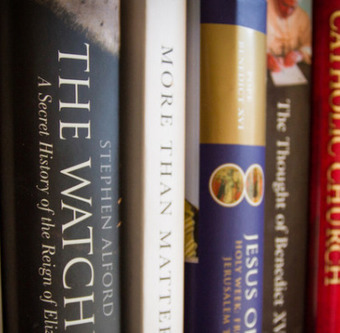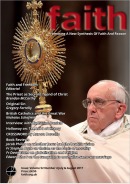
Book Reviews - God and Cosmos: Moral Truth and Human Meaning
The power of theism in modern ethics
God and Cosmos: Moral Truth and Human Meaning by David Baggett and Jerry L. Walls, Oxford University Press, 344pp, £22.99.
reviewed by Stephen Boyle
This book is a sequel (of sorts) to Good God which looked at moral apologetics and a theistic ethic. One is given the impression that the first book was well received. This second book’s intention is to show the weakness of the alternatives to such an ethic and the strength of theistic ethics in explaining moral truth.
The book outlines its view thus: it is not that belief in God is either necessary or sufficient to believe in human dignity, but that a theistic world view is better able, ontologically speaking, to explain intrinsic human dignity.
An abductive approach
In what is called an abductive approach, the method is to look at the various secular and naturalistic ethical theories in a generous way, but then to show just how inadequate they are in giving grounding for objective moral truth. The approach may be courteous, but the critique holds no punches in outlining the serious deficiencies of these approaches and does so with very convincing writing.
The book regularly summarizes what has gone before, which makes it eminently readable for the initiated and the uninitiated. This is particularly helpful in the first two chapters, when one is going through clearly flawed theories. In the third chapter we have summarised the explanatory power of theism in modern ethics. This more positive chapter, and thus more enjoyable to read, is more than adequate reward for efforts made in the previous two chapters.
The problem of evil for naturalistic ethics
The surprise of the book is just how the problem of evil floors so much of the naturalistic ethic. We are informed of approaches that see no responsibly for starving children in Africa and that Hitler should just have acted from a more prudent point of view in his treatment of the Jews. The simple case of Bernie Madoff, who cost innocent people to lose millions of dollars, severely dents the determinist concept of an ethical world. It would seem that contrary to evil being a scandal to theistic belief, it is in the consideration of evil that the naturalistic approach truly falls.
There is also an excellent debate on the reason for sacrificing one’s life for a good cause. How can one do this if there is absolutely no reward? In a debate with C. S. Lewis, Henry Sidgwick and Kant, the authors convincingly put across the view that there has to be a connection between morality and the ultimate self-interest of all rational beings.
It is a mind blowing statement that the true beginning of metaphysics lies in ethics. While Faith continues primarily to reason for the existence of God through science, the book’s salutary contribution to this reviewer’s thought is the case that the moral argument is the most effective in reasoning for God’s existence on university campuses. And it is the case that those who promote the Faith in some cases are surprised by the openness of the younger generation to the Christian foundation to moral truth, as secular reasoning seems gravely deficient.
The Christian foundation of ehtics
It seems there is a real debate in the States such that this book would have an audience. There is a range of writers quoted, with modern authors to the fore. However, Anglophiles will be pleased that C. S. Lewis features so much in the book. I was particularly pleased that Thomas Nagel, an atheist who has made a significant modern contribution to cosmology with his book Mind and Cosmos, is also well quoted. In one memorable paragraph we have the comparison made between a universe without moral laws and led just by human desire, which leads to a dying universe, as indicated by C. S. Lewis in his book The Abolition of Man, and Nagel’s view of the universe becoming aware of itself in man, and becoming conscious of truth, beauty and goodness. C. S. Lewis portrays a world with no moral code that will die, while Nagel portrays a living, conscious, vibrant world, our world, that he as an atheist cannot explain.
Deficiencies
This book is a valuable contribution to the debate on the Christian foundation to ethics, but I should also outline some of its deficiencies. Clearly the authors are in a different world to one experienced in England when they indicate that it is obvious that the historical Jesus and the dedication of his followers have led to a richer world morally, spiritually and socially. One only has to look on YouTube for the debate on this issue with Stephen Fry to see that we are not in the ascendency in this debate.
The authors write from a Christian non-Catholic perspective. Still, it was frustrating that in the debate of the brokenness of man the doctrine of Original Sin, something “as obvious as potatoes” as G. K. Chesterton put it, did not show its face.
For most of the book one is wondering why “Cosmos” is in the title. It is mentioned only in a few paragraphs in the final chapter. This book has no cosmological approach to ethics for the most part, and while the cosmological argument of ethics was succinctly and brilliantly put across in a few paragraphs in the final chapter, this is not enough to justify such a title.
Knowing what is true
The book gives no answer to the question as to how one comes to the moral truths themselves. Underlying the book is the view that as people believe in moral truths, that is the opening to argue for the theistic foundation for such views. However, there is the question as to how one can come to the truth in the first place. And it seems problematic to this reviewer to speak of Christian interior transformation, as the book does, without a clear understanding of what is true. The authors rather give the game away when Professor Dawkins is disparaged for his view in favour of aborting all Down’s syndrome children. I congratulate the stance of the authors of in defence of the unborn. Unfortunately Dawkins is a good example of the zeitgeist in this issue, as 90% of Down’s syndrome in England are already aborted, 100% in Iceland, as we have been informed in a recent TV programme. The debate cannot be just on what are the foundations to moral truth which all agree on. There does need to be an authority somewhere. Paraphrasing the phrase from the X Files series, the truth has to be out there. And living the truth is vital for a true understanding of interior transformation.
The positive points in this book far out way the negative. It convincingly argues that the Christian contribution to the moral debate is a way back for society, and especially the younger generation, to appreciate the true value of a Christian belief.
Notes:
Fr. Stephen Boyle is Parish priest of St. Anselm’s, Dartford, and Southwark chaplain to the guild of St. Stephen Altar Servers

